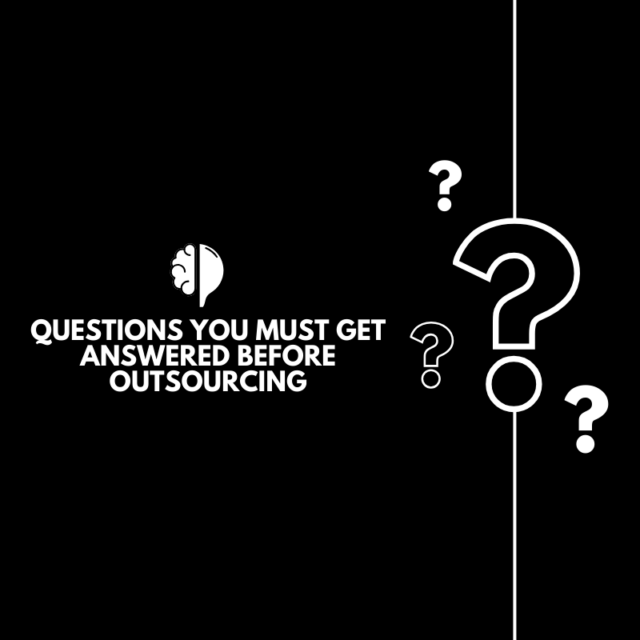Outsourcing has become an essential strategy for businesses looking to scale efficiently, cut costs, and access specialized expertise. However, while outsourcing offers significant benefits, it also comes with challenges. To ensure a successful outsourcing partnership, businesses must conduct thorough due diligence. Asking the right questions before finalizing an outsourcing contract can help mitigate risks and ensure alignment with business objectives.
Understanding Business Needs and Goals
Before engaging with an outsourcing provider, it is crucial to clearly define your business goals and the specific tasks or functions you plan to outsource. Are you looking for cost savings, faster service delivery, or access to specialized skills? Defining expectations early helps in finding the right outsourcing partner who aligns with your business objectives.
A company should also assess whether the functions being outsourced are core business activities or non-essential tasks. While outsourcing can be a game-changer, offloading critical business functions without a proper strategy can lead to inefficiencies and potential risks. Companies must evaluate the impact of outsourcing on overall business operations and customer experience.
Key Questions to Ask:
- What are the primary objectives of outsourcing this function?
- How will outsourcing impact my existing operations and customers?
- What level of control do I want to maintain over the outsourced tasks?
Evaluating the Outsourcing Partner
Once business objectives are defined, the next step is to thoroughly evaluate potential outsourcing vendors. Understanding their expertise, industry experience, and track record is essential. Companies should inquire about the provider’s experience in handling similar projects and whether they have worked with businesses of comparable scale and industry.
Transparency in operations is another critical factor. Prospective outsourcing partners should be willing to provide references from past clients, case studies, and performance reports.
Additionally, an assessment of their infrastructure, workforce capabilities, and technological expertise ensures that they can deliver on expectations.
Key Questions to Ask:
- What is your experience in handling projects similar to ours?
- Can you provide client references or case studies?
- What technology and infrastructure do you use to support outsourcing operations?
Communication and Cultural Compatibility
A successful outsourcing partnership heavily depends on clear communication and cultural compatibility. Differences in time zones, language barriers, and work culture can impact efficiency and collaboration. Therefore, it is vital to establish communication protocols, including response times, reporting structures, and the primary mode of communication.
Cultural alignment is also an often-overlooked aspect of outsourcing. While technical expertise is important, an outsourcing partner should also align with the values and operational ethics of your business. Misalignment in work culture and business approach can lead to misunderstandings and inefficiencies, making it harder to build a long-term partnership.
Key Questions to Ask:
- What communication tools and practices do you use?
- How do you handle time zone differences and ensure smooth collaboration?
- How do you train your teams to align with client business cultures?
Security and Compliance Measures
Data security and regulatory compliance should be among the top concerns when outsourcing, especially when dealing with customer data, financial records, or proprietary business information. Businesses should ensure that the outsourcing provider follows industry-standard security protocols, including data encryption, secure servers, and access control measures.
It is also important to verify if the outsourcing partner complies with relevant regulatory frameworks such as GDPR, HIPAA, or other industry-specific standards. A legally binding agreement outlining confidentiality and data protection measures can safeguard businesses from security breaches and non-compliance risks.
Key Questions to Ask:
- What security measures do you have in place to protect sensitive data?
- Are you compliant with industry regulations such as GDPR or HIPAA?
- What happens in case of a data breach or compliance violation?
Cost Transparency and Hidden Expenses
While cost savings are a primary motivation for outsourcing, businesses must be vigilant about hidden costs. Before signing an agreement, companies should seek clarity on pricing models, additional service charges, and potential escalations in costs over time. Understanding the full financial implications helps in making informed decisions and avoiding unexpected expenses that could erode the expected benefits of outsourcing.
Apart from direct costs, businesses should also consider indirect expenses, such as onboarding, training, and oversight of the outsourcing provider. A well-structured contract with clear service-level agreements (SLAs) ensures that the financial terms remain predictable and beneficial in the long run.
Key Questions to Ask:
- What is your pricing model, and are there any hidden costs?
- How do you handle fluctuations in service demand and associated costs?
- Are there any additional charges for training, onboarding, or technology upgrades?
Scalability and Flexibility
Businesses evolve, and so do their outsourcing needs. A good outsourcing partner should be able to scale operations based on demand fluctuations. Whether it is expanding support services, increasing output, or adapting to new technologies, flexibility is key to maintaining efficiency and competitiveness.
Before outsourcing, companies should discuss growth potential with the provider. Can they accommodate an increase in workload without compromising quality? Are they equipped with the necessary resources and technology to support expansion? A forward-thinking approach ensures that the outsourcing arrangement remains viable as the business grows.
Key Questions to Ask:
- How scalable are your services to meet our future needs?
- How do you handle increased demand or unexpected workload spikes?
- Can you adapt to new technologies and industry trends over time?
Conclusion
Outsourcing can be a strategic asset for businesses, but only when approached with careful consideration.
Asking the right questions before committing to an outsourcing partner helps in making informed decisions, reducing risks, and fostering a productive relationship.
From defining business goals and evaluating vendors to ensuring security and cost transparency, each aspect plays a critical role in the success of an outsourcing initiative.
By thoroughly assessing these factors, businesses can unlock the full potential of outsourcing while maintaining control over quality, efficiency, and customer satisfaction.
Have Questions about Outsourcing?






